German actor Walter Giller (1927-2011) was the cute boy-next-door in German cinema of the 1950s. With Nadja Tiller, he became a Dream Couple in European cinema.

German collectors card in the "Deutsche Filmstars von heute und morgen" series IV. Walter Giller in Die Drei von der Tankstelle/The Three from the Filling Station (Hans Wolff, 1955).
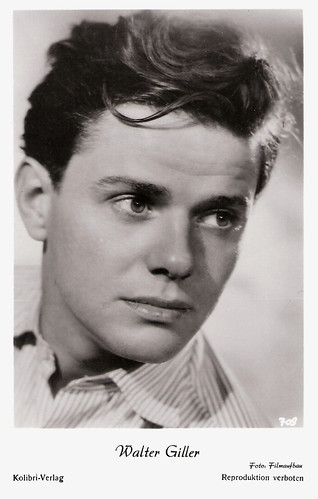
German postcard by Kolibri-Verlag, no. 708. Photo: Filmaufbau.
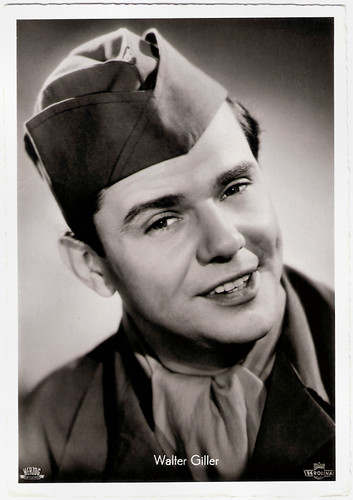
German postcard by Rüdel-Verlag, Hamburg-Bergedorf, no. W 1621. Photo: Berolina / Herzog-Film / Wesel. Publicity still for Die Drei von der Tankstelle/The Three from the Filling Station (Hans Wolff, 1955).
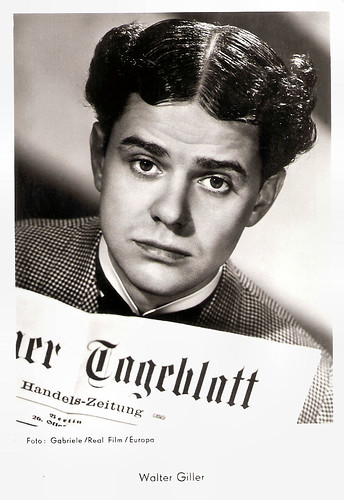
German postcard by Ufa/Film-Foto, Berlin-Tempelhof, no. FK 3206. Photo: Gabriele / Real Film / Europa. Publicity still for Der Hauptmann von Köpenick/The Captain from Koepenick (Helmut Käutner, 1956).
Walter Giller was born in Recklinghausen, Germany in 1927. He was the son of the children’s doctor Dr. Walter Giller and Edwine Giller-Röver and grew up in the Hamburg borough of Hamm.
In 1942, at 15, the grammar school pupil was ordered to serve as a Flakhelfer (a German student deployed as a child soldier during World War II) in anti-aircraft support.
In 1944, Giller became a prisoner of war but was released after staying in a sanatorium for one year to recuperate from a torn lung.
Giller then started to study medicine but soon quit his studies to become a trainee at Hamburg's Kammerspiele (Chamber Theatre) where he also worked as an assistant director.
He later attended actor's training and worked as a supporting actor and assistant director. Giller made his film debut in Artistenblut/Artist’s Blood (Wolfgang Wehrum, 1949) starring Hans Richter, which was followed by Kein Engel ist so rein/No Angel Is As Pure (Helmut Weiss, 1950).
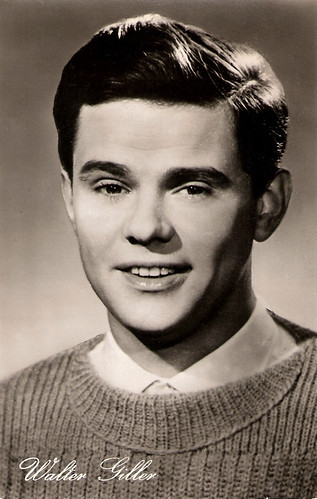
East-German card by VEB Progress Film-Vertreib, Berlin, no. 27/322, 1957. Photo: Real Film. Publicity still for Die Tolle Lola (Hans Deppe, 1954).
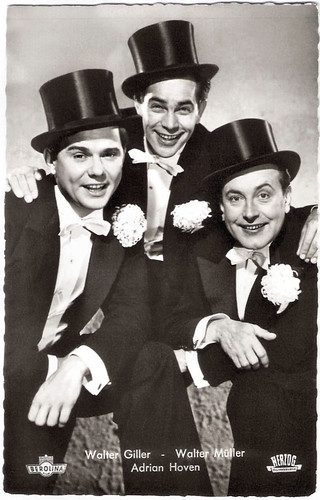
German postcard by Kolibri-Verlag, Minden/Westf., no. 1777. Photo: Berolina / Herzog-Film / Wesel. Publicity still for Die Drei von der Tankstelle/The Three from the Filling Station (Hans Wolff, 1955) with Adrian Hoven and Walter Müller.
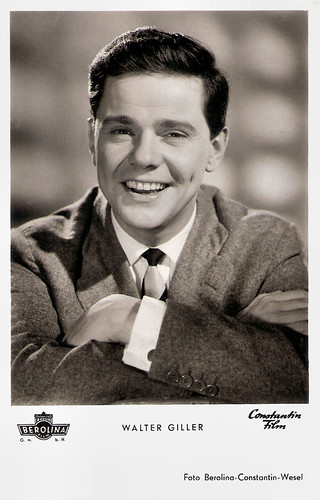
German postcard by Kunst und Bild, Berlin, no. S 559. Photo: Bertolina / Constantin / Wesel. Publicity still for Charleys Tante/Charley's Aunt (Hans Quest, 1956).
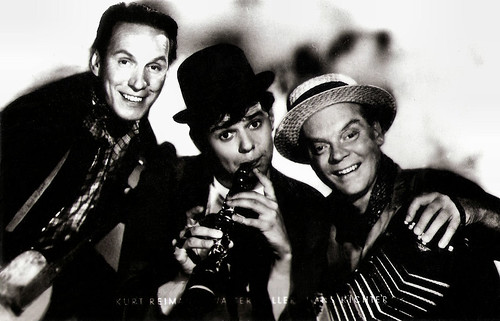
German postcard by Netter's Starverlag, Berlin. Photo: publicity still for Schwarzwaldmelodie/Black Forest Melody (Géza von Bolváry, 1956) with Kurt Reimann and Hans Richter.
Walter Giller mainly appeared in the part of the shy teenage lover, for instance as a student in Primanerinnen/Sixth-Formers (Rolf Thiele, 1951) with Ingrid Andree.
In 1953, Giller quit working at the theatre to focus on his film career and soon started to play comic roles in light entertainment films like Liebe im Finanzamt/Love in the Tax Office (Kurt Hoffmann, 1952), Skandal im Mädchenpensionat/Scandal at the Girls' School (Erich Kobler, 1953) with Marianne Koch, and An jedem Finger zehn/Ten on Every Finger (Erik Ode, 1954) with Germaine Damar. Often comical, often shy, but always cute and never abusive, Walter Giller represented in numerous productions the boy-next-door.
In 1956 Giller married beautiful actress Nadja Tiller. In the 1950s and 1960s, they were seen as a Traumpaar (Dream Couple) of the German entertainment world. Giller played next to Heinz Rühmann in the classic comedy Der Hauptmann von Köpenick/The Captain from Köpenick (Helmut Käutner, 1956).
In 1959 he won the Bundesfilmpreis for his role in Rosen für den Staatsanwalt/Roses for the Prosecutor (Wolfgang Staudte, 1959) as a man sentenced to death for a minor offence during the last months of the war who meets his judge (Martin Held) after the war.
Two years later Giller won the the Bundesfilmpreis again for his role as a trucker from East Berlin in the East-West drama Zwei unter Millionen/Two Among Millions (Victor Vicas, Wieland Liebske, 1961).
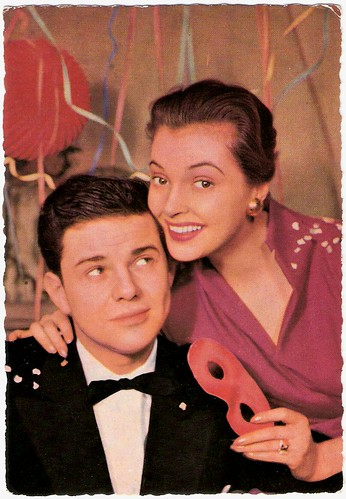
With Nadja Tiller. German postcard by WS-Druck, Wanne-Eickel, no. F 47. Photo: Huster.
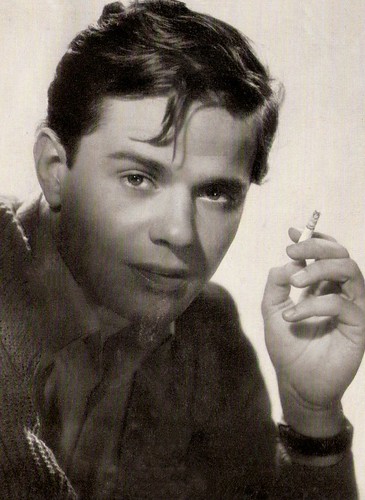
German postcard by Filmbilder-Vertrieb Ernst Freihoff, Essen, no. 146. Retail price: 10 Pfg. Photo: Arthur Grimm.
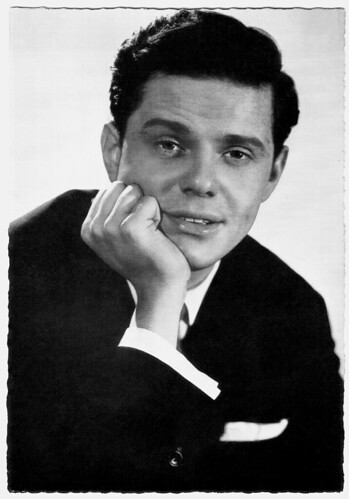
German postcard by WS-Druck, Wanne-Eickel, no. 22. Photo: Arca / NF / v. Mindszenty.
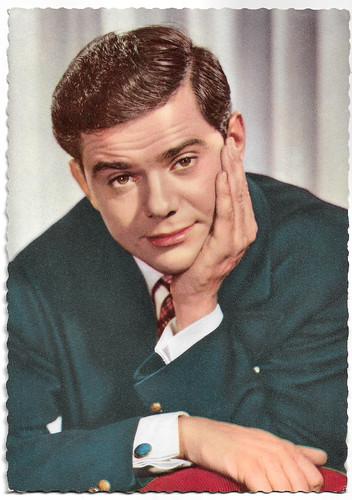
German postcard by Ufa, no. CK-44. Photo: Arthur Grimm / Ufa.
Walter Giller seemed predestined for a great film career, but in the 1960s he appeared mainly in Krimis (German crime films), Karl May Westerns and Pauker comedies.
He starred in the international production Fanny Hill (Russ Meyer, 1964) and in a remake of the Heinz Rühmann success Die Feuerzangenbowle/The Fire Tongue Bowl (Helmut Käutner, 1970) but to no avail.
One of Walter Giller's few important roles was the part of writer Daddy in the Kurt Tucholsky adaptation Schloss Gripsholm/The Gripsholm Castle (Kurt Hoffmann, 1963). He also played the lead in the award-winning TV film Der geborgte Weihnachtsbaum/The Borrowed Christmas Tree (Dietrich Haugk, 1966).
From the 1970s on, he changed his focus to television series such as Das Traumschiff/The Dream Boat (1983) and Sylter Geschichten/Tales From Sylt (Karsten Wichniarz, 1995). He intensified his stage work, and did many tours, often together with Nadja Tiller. In 2006 the duo won a Bambi award for their lifetime achievements.
In 2009, about 30 years after his last appearance in the cinema, director Leander Haußmann rediscovered Walter Giller for the big screen. In the comedy Dinosaurier – Gegen uns seht ihr alt aus!/Dinosaur (Leander Haußmann, 2009), he played a member of a spritely gang of pensioners alongside Eva-Maria Hagen, Ezard Haußmann, and Nadja Tiller.
In 2009, Walter Giller was diagnosed with lung cancer. He underwent a major (but unsuccessful) operation. He died in 2011 in a retirement home in Hamburg, aged 84. He and Tiller had a daughter, Natascha, and a son, Jan-Claudius.
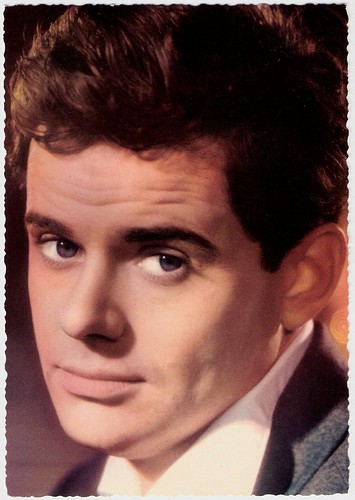
German postcard by ISV, no. M 3. Photo: Europa Film / Arthur Grimm.
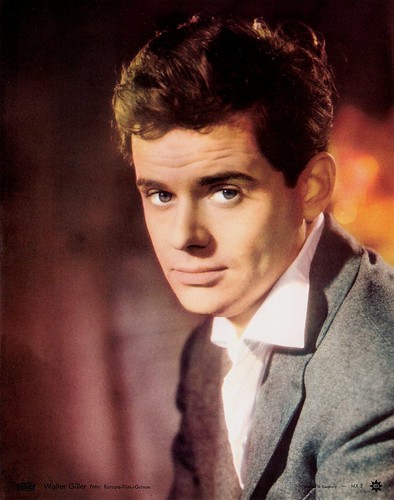
Big German card by ISV, no. MX 3. Photo: Europa Film / Arthur Grimm.
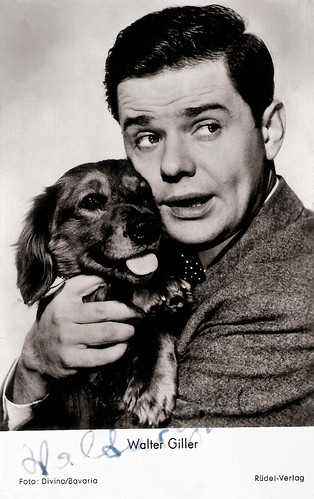
German postcard by Rüdel-Verlag, Hamburg-Bergedorf, no. 2675. Photo: Divina / Bavaria. Publicity still for Liebe auf krummen Beinen (Thomas Engel, 1959).
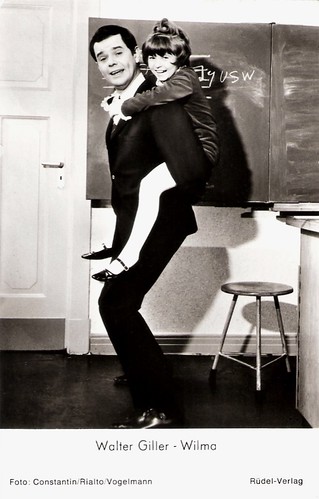
German postcard by Rüdel-Verlag, Hamburg, no. 5009, 1969. Photo: Constantin / Rialto / Vogelmann. Publicity still for Klassenkeile/Spanking at School (Franz Josef Gottlieb, 1969) with Wilma.
Sources: Tom B. (Boot Hill - now defunct), Filmportal.de, Wikipedia, Prisma, and IMDb.
This post was last updated on 22 May 2024.

German collectors card in the "Deutsche Filmstars von heute und morgen" series IV. Walter Giller in Die Drei von der Tankstelle/The Three from the Filling Station (Hans Wolff, 1955).

German postcard by Kolibri-Verlag, no. 708. Photo: Filmaufbau.

German postcard by Rüdel-Verlag, Hamburg-Bergedorf, no. W 1621. Photo: Berolina / Herzog-Film / Wesel. Publicity still for Die Drei von der Tankstelle/The Three from the Filling Station (Hans Wolff, 1955).

German postcard by Ufa/Film-Foto, Berlin-Tempelhof, no. FK 3206. Photo: Gabriele / Real Film / Europa. Publicity still for Der Hauptmann von Köpenick/The Captain from Koepenick (Helmut Käutner, 1956).
Prisoner of war
Walter Giller was born in Recklinghausen, Germany in 1927. He was the son of the children’s doctor Dr. Walter Giller and Edwine Giller-Röver and grew up in the Hamburg borough of Hamm.
In 1942, at 15, the grammar school pupil was ordered to serve as a Flakhelfer (a German student deployed as a child soldier during World War II) in anti-aircraft support.
In 1944, Giller became a prisoner of war but was released after staying in a sanatorium for one year to recuperate from a torn lung.
Giller then started to study medicine but soon quit his studies to become a trainee at Hamburg's Kammerspiele (Chamber Theatre) where he also worked as an assistant director.
He later attended actor's training and worked as a supporting actor and assistant director. Giller made his film debut in Artistenblut/Artist’s Blood (Wolfgang Wehrum, 1949) starring Hans Richter, which was followed by Kein Engel ist so rein/No Angel Is As Pure (Helmut Weiss, 1950).

East-German card by VEB Progress Film-Vertreib, Berlin, no. 27/322, 1957. Photo: Real Film. Publicity still for Die Tolle Lola (Hans Deppe, 1954).

German postcard by Kolibri-Verlag, Minden/Westf., no. 1777. Photo: Berolina / Herzog-Film / Wesel. Publicity still for Die Drei von der Tankstelle/The Three from the Filling Station (Hans Wolff, 1955) with Adrian Hoven and Walter Müller.

German postcard by Kunst und Bild, Berlin, no. S 559. Photo: Bertolina / Constantin / Wesel. Publicity still for Charleys Tante/Charley's Aunt (Hans Quest, 1956).

German postcard by Netter's Starverlag, Berlin. Photo: publicity still for Schwarzwaldmelodie/Black Forest Melody (Géza von Bolváry, 1956) with Kurt Reimann and Hans Richter.
Shy teenage lover
Walter Giller mainly appeared in the part of the shy teenage lover, for instance as a student in Primanerinnen/Sixth-Formers (Rolf Thiele, 1951) with Ingrid Andree.
In 1953, Giller quit working at the theatre to focus on his film career and soon started to play comic roles in light entertainment films like Liebe im Finanzamt/Love in the Tax Office (Kurt Hoffmann, 1952), Skandal im Mädchenpensionat/Scandal at the Girls' School (Erich Kobler, 1953) with Marianne Koch, and An jedem Finger zehn/Ten on Every Finger (Erik Ode, 1954) with Germaine Damar. Often comical, often shy, but always cute and never abusive, Walter Giller represented in numerous productions the boy-next-door.
In 1956 Giller married beautiful actress Nadja Tiller. In the 1950s and 1960s, they were seen as a Traumpaar (Dream Couple) of the German entertainment world. Giller played next to Heinz Rühmann in the classic comedy Der Hauptmann von Köpenick/The Captain from Köpenick (Helmut Käutner, 1956).
In 1959 he won the Bundesfilmpreis for his role in Rosen für den Staatsanwalt/Roses for the Prosecutor (Wolfgang Staudte, 1959) as a man sentenced to death for a minor offence during the last months of the war who meets his judge (Martin Held) after the war.
Two years later Giller won the the Bundesfilmpreis again for his role as a trucker from East Berlin in the East-West drama Zwei unter Millionen/Two Among Millions (Victor Vicas, Wieland Liebske, 1961).

With Nadja Tiller. German postcard by WS-Druck, Wanne-Eickel, no. F 47. Photo: Huster.

German postcard by Filmbilder-Vertrieb Ernst Freihoff, Essen, no. 146. Retail price: 10 Pfg. Photo: Arthur Grimm.

German postcard by WS-Druck, Wanne-Eickel, no. 22. Photo: Arca / NF / v. Mindszenty.

German postcard by Ufa, no. CK-44. Photo: Arthur Grimm / Ufa.
Predestined for a great film career
Walter Giller seemed predestined for a great film career, but in the 1960s he appeared mainly in Krimis (German crime films), Karl May Westerns and Pauker comedies.
He starred in the international production Fanny Hill (Russ Meyer, 1964) and in a remake of the Heinz Rühmann success Die Feuerzangenbowle/The Fire Tongue Bowl (Helmut Käutner, 1970) but to no avail.
One of Walter Giller's few important roles was the part of writer Daddy in the Kurt Tucholsky adaptation Schloss Gripsholm/The Gripsholm Castle (Kurt Hoffmann, 1963). He also played the lead in the award-winning TV film Der geborgte Weihnachtsbaum/The Borrowed Christmas Tree (Dietrich Haugk, 1966).
From the 1970s on, he changed his focus to television series such as Das Traumschiff/The Dream Boat (1983) and Sylter Geschichten/Tales From Sylt (Karsten Wichniarz, 1995). He intensified his stage work, and did many tours, often together with Nadja Tiller. In 2006 the duo won a Bambi award for their lifetime achievements.
In 2009, about 30 years after his last appearance in the cinema, director Leander Haußmann rediscovered Walter Giller for the big screen. In the comedy Dinosaurier – Gegen uns seht ihr alt aus!/Dinosaur (Leander Haußmann, 2009), he played a member of a spritely gang of pensioners alongside Eva-Maria Hagen, Ezard Haußmann, and Nadja Tiller.
In 2009, Walter Giller was diagnosed with lung cancer. He underwent a major (but unsuccessful) operation. He died in 2011 in a retirement home in Hamburg, aged 84. He and Tiller had a daughter, Natascha, and a son, Jan-Claudius.

German postcard by ISV, no. M 3. Photo: Europa Film / Arthur Grimm.

Big German card by ISV, no. MX 3. Photo: Europa Film / Arthur Grimm.

German postcard by Rüdel-Verlag, Hamburg-Bergedorf, no. 2675. Photo: Divina / Bavaria. Publicity still for Liebe auf krummen Beinen (Thomas Engel, 1959).

German postcard by Rüdel-Verlag, Hamburg, no. 5009, 1969. Photo: Constantin / Rialto / Vogelmann. Publicity still for Klassenkeile/Spanking at School (Franz Josef Gottlieb, 1969) with Wilma.
Sources: Tom B. (Boot Hill - now defunct), Filmportal.de, Wikipedia, Prisma, and IMDb.
This post was last updated on 22 May 2024.
3 comments:
Wonderful blog. I'll be adding a link.
He was very handsome!
Yes, so cute. Thanks for your comments.
Post a Comment